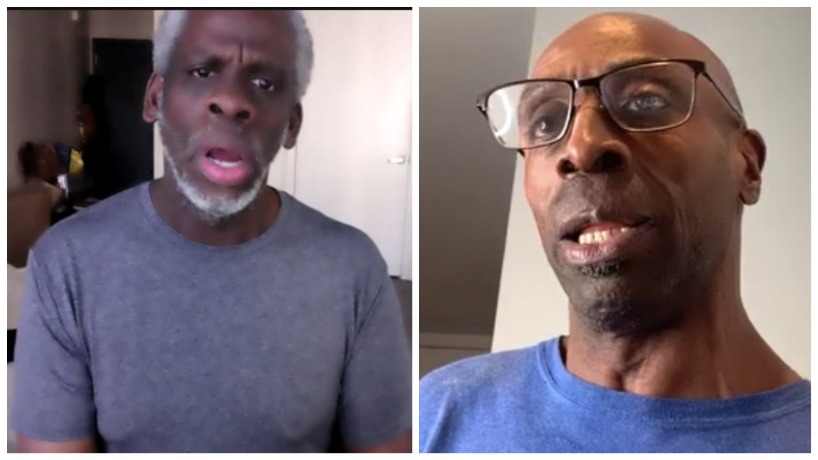
Leroy Moore and Keith Jones are both hip-hop artists with cerebral palsy. They are two of the founders of Krip-Hop, a movement that uses hip-hop music and other forms of artistic expression to allow disabled people to communicate and share their experiences.(Screenshot)
Noted writer, poet and disability rights activist Leroy Moore visited the National Museum of African American History and Culture in Washington, D.C. a couple of years ago.
The building, opened on the National Mall in 2016, has been lauded for its architecture, with one critic calling it “the most ambitious public building to go up in Washington in a generation.” Its collection includes more than 40,000 objects, about 3,500 on display to the public.
While Moore got a lot out of seeing the rich history presented in its exhibits, he left feeling disappointed by something that was missing.
“There was nothing about disabilities,” Moore recalled to an audience of a few dozen people who gathered on Zoom last Friday afternoon.
Not that Moore was surprised. Black people with disabilities are twice marginalized in American society because of their race and their physical or mental impairment.
That’s a big reason why representatives of the University of Missouri–St. Louis’ Succeed Program invited Moore and fellow activist Keith Jones to speak at a virtual event titled, “On the Beat with Leroy Moore and Keith Jones: Turn up the Voices of Black Disability Advocates.”
Moore and Jones, who both have cerebral palsy, are two of the founders of Krip-Hop Nation, a movement that uses hip-hop music and other forms of artistic expression to allow disabled people to communicate and share their experiences.
MSW practicum student Jelena Basara, who works with the Succeed program, hosted the event, which was part of UMSL’s month-long celebration of Black History Month.
Second-year Succeed student Tyler Haynes helped guide the discussion with a series of questions, including how the duo became involved in activism.
“I learned from my mom that you have to fight for your own self,” Moore said. “That’s what I did. I saw my mom fighting for myself, and not only myself but my community – my Black disabled brothers and sisters.”
“For people with a disability, there’s nothing that says you have to be an advocate,” added Jones, who grew up in Florissant, Missouri. “Literally, the reason you’re an advocate is because society sucks at being a good society. When you’re advocating, you’re trying to get it to be unsucky, so that you can just wake up and be who you are and be in your humanity and move through life.”
Both have been inspired from their travels around the world meeting with and advocating on behalf of other disabled individuals.
“Disabled people have a rich culture, a rich history, a rich connection that we need to be proud of,” said Moore, who authored books such as “Black Disabled Art History 101” and “Black Disabled Ancestors” to celebrate those accomplishments.
Moore has been touched by how many people have reached out to thank him for his work and what it’s done to educate more people about the issues impacting people with disabilities.
He encouraged the audience, many of whom are Succeed students, to embrace who they are and learn about their disabilities.
Moore and Jones concluded the two-hour session by sharing some of their work. Moore read a poem called, “I’m Not Your Cripple” and Jones had the audience bopping their heads along with him as he rapped a new single titled “MC with CP.”














